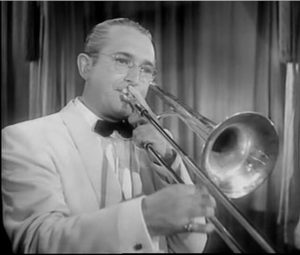Carolina Shout
James P. Johnson
A tribute to the pioneering stride pianist
Click here if you have a memory of this artist that you’d like to share
Pianist and composer James P. Johnson was born on February 1, 1894 in New Brunswick, New Jersey.
Johnson had piano lessons from his mother, developed quickly, and as a young teenager was already playing at rent parties.
A professional by 1912, Johnson played solo piano in clubs, toured in vaudeville, cut piano rolls (starting in 1917), and also did theatre work.
While he grew up during the ragtime era, Johnson moved piano music beyond ragtime, striding with his left hand (moving back and forth between bass notes and chords that were played an octave or two higher) while his right improvised an endless series of melodic variations.
Known as “the king of stride piano,” James P. Johnson developed into one of the greatest jazz pianists of all time, influencing a generation of pianists (including his protégé Fats Waller) and even Duke Ellington, Earl Hines, Art Tatum and Thelonious Monk.
Johnson, who first recorded in 1921 (including “Carolina Shout” which became a test piece for up-and-coming pianists), led some hot combo recording dates, recorded as an accompanist to a variety of classic blues singers (including memorable encounters with Bessie Smith and Ethel Waters), and was the star of a countless number of rent parties and jam sessions, often with his friends Willie “the Lion” Smith and Fats Waller.
In addition, Johnson wrote such standards as “If I Could Be With You One Hour Tonight,” “Old Fashioned Love” and the theme song of the 1920s, “The Charleston.”
In July 1928 he debuted his extended work “Yamecraw” at Carnegie Hall and, while out of the limelight during much of the 1930s. he spent the decade concentrating on composing large-scale orchestral works, including “Harlem Symphony,” “Jassamine” “Symphony In Brown,” and a blues opera called “De Organizer.”
After appearing at John Hammond’s Spirituals To Swing concert in Dec. 1938, Johnson began performing in public more regularly again, continuing through the 1940s despite having a stroke in 1946 until a second and much more severe stroke in 1951 ended his playing days four years before his death.
Here is a 1944 recording of James P. Johnson (who unfortunately was never filmed) performing “Carolina Shout.”
-Scott Yanow
Click here to Support 30sJazz

